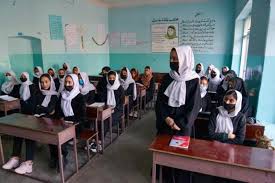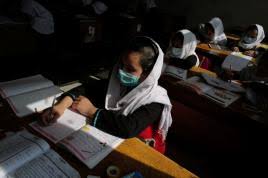The academic year and the continuation of the ban on girls’ education
The ban on girls’ education in Afghanistan, which has been in place since the Taliban came to power in 2021, continues to be one of the most serious human rights and educational crises in the country. As each school year begins, millions of Afghan girls are deprived of their right to education, and this will have profound and long-term effects on society. Below we discuss the various dimensions of this ban and its consequences:
1. Current restrictions on girls’ education
• Prohibition of secondary and higher schools: Girls above the sixth grade are not allowed to attend schools. Universities are also closed to women.
• Preventing informal education: Even local and non-governmental efforts to educate girls have been limited or shut down by the Taliban.
• Restrictions on female teachers: female teachers are also facing problems in hiring and continuing to work in educational centers.
2. Social and economic consequences of banning education
• Increasing illiteracy: This ban will increase the educational gap between men and women and spread illiteracy among the next generation of girls.
• Reduction of economic opportunities: Girls who are deprived of education cannot enter the labor market in the future, which leads to the aggravation of poverty.
• Weakening of society: lack of education of women has a negative effect on the whole society, because women play a key role in raising children and social development.
• Increasing child marriage: With schools closed, many girls are forced to marry at a young age or under pressure from their families.
3. National and international reactions
• Widespread global criticism: Various countries, human rights organizations, and the United Nations have repeatedly called on the Taliban to lift the ban, but so far to no avail.
• Civic activism: Afghan women continue to resist and try to challenge these restrictions through clandestine education or protests.
• Conditional Aid: Many countries have made humanitarian aid to Afghanistan conditional on lifting this ban.
4. Possible solutions to deal with the crisis
• Increasing international pressure: The international community should use diplomatic and economic tools to put pressure on the Taliban.
• Supporting non-formal education: Organizations and activists can help girls by creating informal schools and online education.
• Strengthening domestic awareness: Afghan men and families must understand the importance of girls’ education and resist these restrictions.
• Recording the history of prohibitions: recording and documenting the consequences of this prohibition is necessary to inform future generations and the world community.
5. The future without girls’ education
• If this trend continues, Afghanistan will face more serious crises, including a decrease in skilled labor, worsening poverty and inequality, and further isolation globally.
Education of girls is not only a human right but also a necessity for social and economic development. Banning them from education paints a bleak future for Afghanistan unless immediate and concerted action is taken to end this crisis.
Why are the Taliban against women’s education?
The Taliban provide various reasons for their opposition to women’s education, often rooted in their particular interpretation of Islamic law, social traditions, and their political approach. However, many of these reasons have been widely criticized and opposed by religious scholars, human rights activists, and the international community. In the following, the most important reasons claimed by the Taliban and their analysis are discussed:
1. Limited and extreme interpretation of Islamic Sharia
• The Taliban claim that women’s education should be done in accordance with Islamic principles and in completely separate environments from men. They often use the lack of a “safe environment” or “proper hijab” as an excuse to close schools and universities.
Criticism: Many prominent Islamic scholars have emphasized that education for women and men is a religious duty and Islam has not placed any restrictions on women’s education.
2. Worry about cultural and social influences
• The Taliban believe that women’s education may lead to “cultural changes” and threaten traditional values and gender roles in society.
• Criticism: This concern stems more from the cultural conservatism of the Taliban than Islamic teachings. In many Islamic countries, educated women have effective social and economic roles while maintaining religious and cultural values.
3. Social and political control
• One of the main reasons for the Taliban’s opposition to women’s education is the attempt to limit their social and political role. The Taliban know that educated women are becoming more informed and independent and may resist their restrictive policies.
• Criticism: This policy deprives the Afghan society of half of its human resources and fuels the backwardness of the country.
4. Worry about the influence of the West and modernity
• The Taliban claim that modern education systems are influenced by Western culture and may alienate women from Islamic and traditional values.
• Criticism: This claim is made while education can be redefined based on national and Islamic values, without conflicting with modernity or scientific progress.
5. Maintaining patriarchy
• By banning women’s education, the Taliban have strengthened the patriarchal structure of society and marginalized women to ensure their control over society.
Criticism: This view is not only un-Islamic, but also hinders the social, economic and cultural progress of the entire society.
6. Inability to manage the educational system
• In some cases, the ban on women’s education is due to the Taliban’s weakness in providing infrastructure and managing a separate education system for women.
Criticism: This managerial weakness cannot be a justification for violating women’s rights and denying them education.
The consequences of this approach for the Taliban and the Afghan society
• Increasing international isolation: Taliban policies have reduced their legitimacy in the international community and limited humanitarian aid.
• Aggravation of social crises: Depriving women of education will lead to an increase in illiteracy, poverty, and social crises.
• Strengthening internal resistance: Afghan women are resisting these policies in various ways, including secret training, and the support of enlightened men is also increasing.

